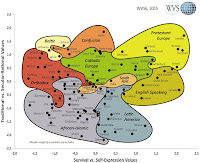Nutrient density of beverages in relation to climate impact
"The food chain contributes to a substantial part of greenhouse gas (GHG) emissions and growing evidence points to the urgent need to reduce GHGs emissions worldwide. Among suggestions were proposals to alter food consumption patterns by replacing animal foods with more plant-based foods. However, the nutritional dimensions of changing consumption patterns to lower GHG emissions still remains relatively unexplored. This study is the first to estimate the composite nutrient density, expressed as percentage of Nordic Nutrition Recommendations (NNR) for 21 essential nutrients, in relation to cost in GHG emissions of the production from a life cycle perspective, expressed in grams of CO2-equivalents, using an index called the Nutrient Density to Climate Impact (NDCI) index. The NDCI index was calculated for milk, soft drink, orange juice, beer, wine, bottled carbonated water, soy drink, and oat drink. Due to low-nutrient density, the NDCI index was 0 for carbonated water, soft drink, and beer and below 0.1 for red wine and oat drink...."

Kommentarer
Skicka en kommentar